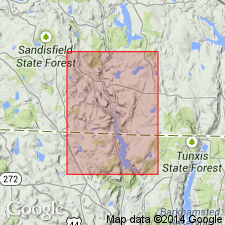
- Usage in publication:
-
- Bee Brook Formation
- Modifications:
-
- First used
- Dominant lithology:
-
- Granulite
- Quartzite
- Schist
- Amphibolite
- AAPG geologic province:
-
- New England province
Summary:
Bee Brook Formation included in Hartland Group in the Cameron's Line thrust sheet along with Mt. Rat Schist and Mt. Prospect Formation [Prospect Formation?]. Hartland Group in the Bantam Lake thrust sheet consists of the Litchfield Schist and the Mt. Tom Amphibolite. Bee Brook is described as a thinly bedded unit of fine-grained, gray, massive to laminated, quartz granulites and quartzites, silver gray, muscovite schist, and subordinate, dark-gray, muscovite biotite schist. Coticule layers are common. Locally subdivided into three members: muscovite schist, gneiss and granulite, and amphibolite. Map symbol indicates a Cambrian(?) and Ordovician age.
Source: GNU records (USGS DDS-6; Reston GNULEX).
For more information, please contact Nancy Stamm, Geologic Names Committee Secretary.
Asterisk (*) indicates published by U.S. Geological Survey authors.
"No current usage" (†) implies that a name has been abandoned or has fallen into disuse. Former usage and, if known, replacement name given in parentheses ( ).
Slash (/) indicates name conflicts with nomenclatural guidelines (CSN, 1933; ACSN, 1961, 1970; NACSN, 1983, 2005, 2021). May be explained within brackets ([ ]).

